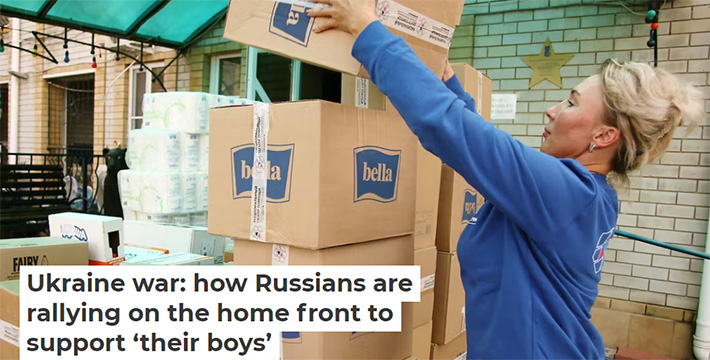
There’s a discernible “enemy-at-the-gate” feeling among ordinary people on the streets of Russia. Their sons are being sent off to fight – and some have died.
Meanwhile, the cross-border raids from Ukraine on Russia’s territory and drone attacks on Moscow suburbs during the past few months have bolstered the Kremlin’s argument that Russia is fighting to defend itself, writes Australian ‘The Conversation’.
Civil society is responding. The volunteer effort to support “our guys” is growing. To be patriotic, for many ordinary Russian citizens, is to “do your bit” to support the war effort.
Doing your bit comes in different forms. There are the numerous grassroots campaigns, many of them led by women who are working hard to supply clothing, medical supplies and comforts to the men at the front.
Then there are veteran groups which are crowdfunding military material such as drones and offering training and protective equipment to make up a perceived shortfall in government provision.
For example, Rokot Centre-33 organised a volunteer forum in provincial Vladimir in May 2023 which brought together engineers and grassroots producers of FPV drones, electronic warfare devices, metal detectors, camouflage nets, trench sleeping bags and the like.
‘Golden Hands of an Angel’, a grassroots campaign run by Lyudmila Sushetskaya and Natalia Prahova, manufactures stretchers and other battlefield rescue equipment for Russia’s frontline troops. By December it was estimated that the organisation had raised more than US$58 million (£46 million).
According to posts on one group’s Telegram channel, volunteers typically load supplies into a privately owned truck, cross into Ukraine and (as the slang term runs), go “over the little ribbon” between civilian territory and the frontlines, where they are met by representatives of a battalion or a squad, who they are helping.
Most participants are of modest means: donations are typically up to 1,000 roubles (£10). One charity drive, #MYVMESTE, which had been set up in 2020 to help people under lockdown, has continued to operate to support the war effort. They have knitted thousands of pairs of socks and sewn balaclavas for troops – but also crowdfunded drones.
These campaigns tend to be run by middle-class people – often women with no family links to the front. Something I have heard from people in Russia is that it is better to support those who are fighting already and ensure that they have what they need. Otherwise their own sons might be sent to the front.
Many are about the safety and comfort of their men at the front: providing portable heaters or knitting camouflage netting helps to keep the men safe and improves their comfort. For others, it is a form of solidarity and participation, that gives a socially relevant meaning to their lives, a sense of belonging to a wider network and connections with communities across the country.
There are also religious zealots, inspired by the blessing of the Russian Orthodox Church for the war. And there are those who feel that in this pivotal time in Russia, they should not be passive.
Meanwhile, as in western Europe for Ukrainians fleeing the violence, there is compassion in border communities for more than 2.85 millions displaced Ukrainians. The number of people involved in donating money to refugees and migrants, which had reportedly not been a popular charity sector after Russia started fighting in Ukraine in 2014, tripled in 2022 when the full-scale war began.
The war has transformed. It has inspired civic activism and showed that a civil society has emerged, albeit of a different sort than the West – which was hoping for grassroots opposition to the war – had aspired for.
So far, it is apolitical, critical of the government procurement failure, hoping for some kind of victory or at least resolution so that the war can be over – which is what most people really want.
The recent attacks on Russian territory have galvanised this idea of a “defensive war” among many ordinary people. They have exposed a degree of latent patriotism that may not already have been on display among those who had their doubts about invading Ukraine. This shows that the war has activated social forces in Russia.
Russian society, after its initial ambivalence, is becoming more supportive. The process of turning a special military operations into a “People’s War” appears to have begun, ‘The Conversation’ stresses.
read more in our Telegram-channel https://t.me/The_International_Affairs

 10:43 29.07.2023 •
10:43 29.07.2023 •






















